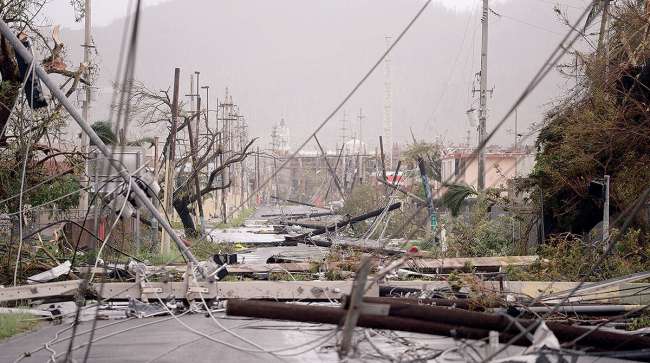Senior Reporter
ASCE Gives Puerto Rico’s Infrastructure Near-Failing D- Grade

[Stay on top of transportation news: Get TTNews in your inbox.]
Puerto Rico’s overall infrastructure is at an almost failing level, a group of engineers determined in a first-of-its-kind report unveiled Nov. 12.
Long-standing infrastructure woes were exacerbated after two hurricanes destroyed significant elements of the U.S. territory’s transportation system in 2017, concluded the authors of the first report card issued to Puerto Rico by the American Society of Civil Engineers. The overall grade given to the island was a D-.
2019 Puerto Rico Report Car... by Transport Topics on Scribd
The overall grade for the territory was reached after an evaluation of eight categories. Seven out of eight aspects of the island’s network received near-failing grades. Bridges, dams and wastewater systems received D+ grades. Drinking water systems and ports were issued a D grade. Road networks and solid waste operations received a D- grade. A failing grade of F was issued to the energy grid.
According to the report, the F grade “was driven by poor existing conditions, insufficient capacity and redundancy, inadequate restoration following 2017 hurricanes, poor maintenance and investment strategies, and a need for system-wide improvements.”
Additionally, the report indicated: “The lack of a reliable energy infrastructure today is greatly impacting human life and commerce, contributing to continued economic hardship and ever-growing financial crisis.”
Inadequate connectivity along roadways contributed to congestion woes, as well. The average commuter sat nearly 60 hours in traffic in 2017. Such congestion was attributed to demand for medical and governmental services, and private industries in metropolitan regions. Also, closures due to construction, storms, poor road conditions and flooding contributed to congestion.
To mitigate congestion, the report’s authors recommended relocating government agencies or offices outside of congested areas, as well as facilitating access to adequate public transportation systems. Also, assessing the island’s National Highway Freight Network as it relates to resiliency and availability after possible natural disasters was recommended.
On the issue of ports, repair costs are estimated to be more than $750 million, according to the report. The role that ports play on the region was highlighted in the report: “Ninety-eight percent of the island’s electricity comes from imported petroleum, natural gas and coal. Approximately 80% of the island’s food is currently imported. Ports also play an important role in the tourism industry.”
Overall, the report card concluded that the commonwealth needs to raise investments by $1.3 billion to $2.3 billion per year, or $13 billion to $23 billion over the next decade, to achieve a system capable of supporting economic growth and competitiveness.
The first-ever Report Card for Puerto Rico's Infrastructure was released by the Puerto Section of ASCE today, giving eight categories of infrastructure an overall grade of a ‘D-.’ Energy received the lowest grade of 'F.'https://t.co/duhooBn8Se — ASCE Gov't Relations (@ASCEGovRel) November 12, 2019
State Sen. Larry Seilhamer-Rodríguez said he hoped the report card would sound the alarm on the island’s modernization needs. As he put it, “Congress has a part to play in directing training, further technical expertise and resources to Puerto Rico to ensure the continued recovery of the island. It is imperative, looking forward, that Puerto Rico and Congress spend the remaining funds on resilient and sustainable infrastructure projects to better protect against future hazards.”
“Looking at these dire grades across all categories, I believe we have an opportunity here to make our island more resilient, sustainable, improve our economy and be better prepared when the next disaster strikes,” added Héctor Colón De La Cruz, ASCE Puerto Rico section president and Puerto Rico infrastructure report card chairman.
Members of Congress in Washington are increasingly discussing the role of climate-resilient infrastructure after freight and passenger corridors were deemed inoperable following hurricanes that hit Puerto Rico, the U.S. Virgin Islands, Florida and Texas. To ensure the uninterrupted flow of goods and services, several congressional transportation leaders have proposed advancing projects capable of withstanding the impact of severe weather events.
The American Society of Civil Engineers’ grade in 2017 for the country’s infrastructure was a D+. The engineers have urged congressional action on establishing a sustainable source of funding for the Highway Trust Fund through an increase of the national fuel tax. The trust fund relies on insufficient revenue from the gas and diesel tax to assist state agencies with projects.
Want more news? Listen to today's daily briefing:

